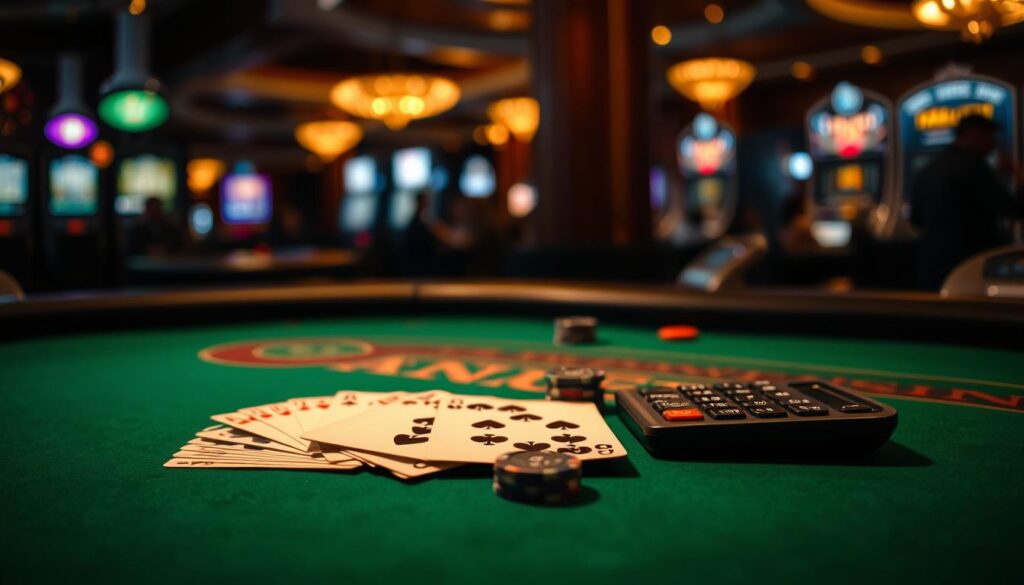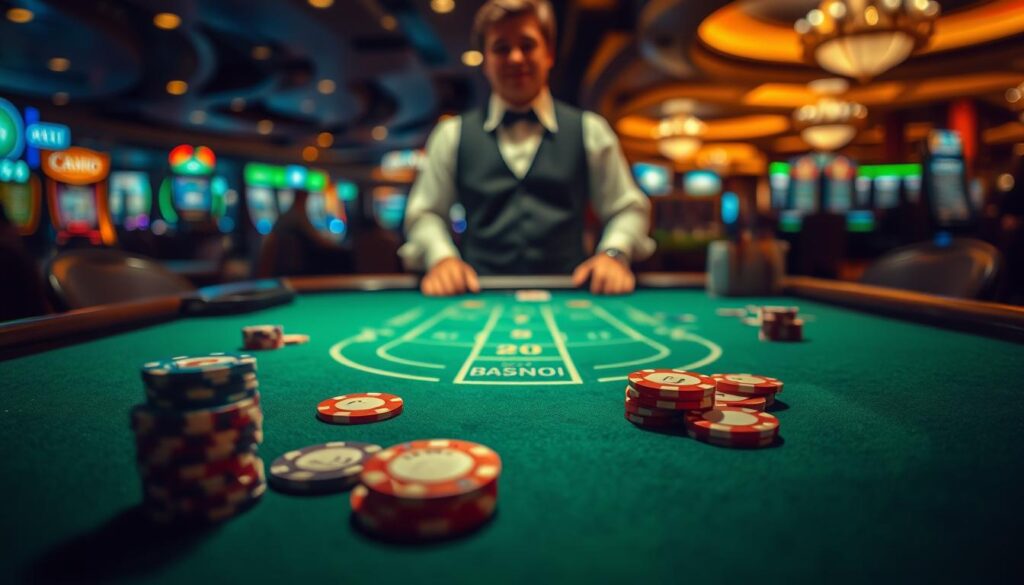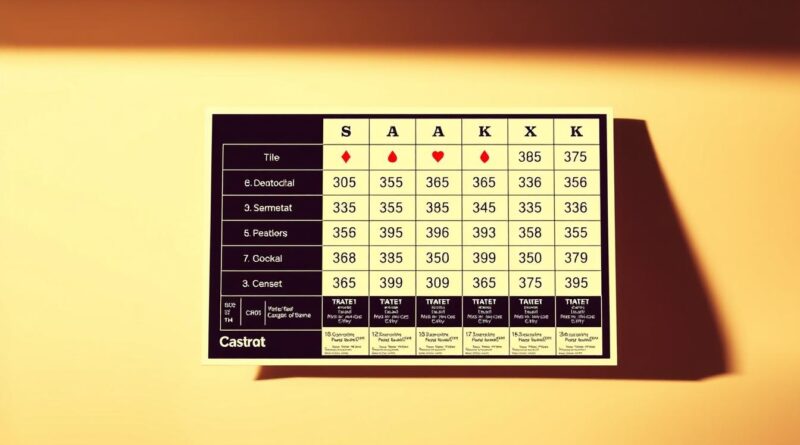Avoid These Common Blackjack Mistakes & Win Big
At Dewakoin, we’ve seen many players hurt their chances at blackjack. Blackjack has great odds, but only if you play smart. Computer simulations show the best moves for every hand, yet we see the same mistakes over and over.
Did you know using the right blackjack strategy can cut the house edge to 0.5%? That’s right—avoiding common mistakes can greatly improve your chances of winning. Most players don’t know they’re making moves that slowly take away their money.
Our team has looked at thousands of hands and found what makes winners and losers. We’ve seen players miss chances to improve their hand by standing on soft 18 against a dealer’s 9. We’ve also seen them take insurance bets with a 7% house edge, or split tens when keeping a strong 20 is better.
Ready to stop making these mistakes? We’re about to share a secret that will change your blackjack game. Let us show you how to avoid these costly errors and play like a pro!
Key Takeaways
- Following basic blackjack strategy can cut the house edge to as low as 0.5%
- Standing on soft 18 against a dealer’s 9 reduces winning potential by missing chances to improve your hand
- Insurance bets carry a 7% house edge and result in losses 70% of the time
- Splitting tens decreases your chances of winning compared to keeping a strong 20
- Proper bankroll management suggests betting only 1-5% of your total funds per hand
- 6-to-5 blackjack payouts increase the house edge by 200-300% compared to 3-to-2 payouts
- Players who ignore basic strategy increase the house edge against themselves by 1-2%
Understanding the Impact of Blackjack Errors on Your Bankroll
Your strategy for managing your blackjack bankroll is key to success. Even with perfect play, the game’s natural variance can be tough. Mistakes can greatly reduce your profits.
How Small Mistakes Add Up Over Time
Small errors might seem minor at first, but they add up fast. Players who don’t follow basic strategy can lose up to 5% more than those who do. This means losing a lot more money over time.
For example, betting $25 per hand and playing 100 hands an hour can cost you extra. An extra 2% house edge means losing $50 an hour. Over a weekend, that’s hundreds of dollars lost.
The Mathematical Cost of Poor Decisions
Every blackjack decision has a specific edge. Mistakes like hitting on 16 against a dealer’s 10 or taking insurance bets cost you. Players who double down incorrectly can lose 10-15% more of their bankroll.
About 30% of players know basic strategy. This is why casinos still make money, even with a low house advantage. Each mistake has a cost that adds up with every hand.
Why Even Experienced Players Make Costly Errors
Even experienced players make mistakes. Fatigue or emotions can lead to poor decisions. The pressure of losing can make players bet more than they should.
Most experienced players know the math, but it’s hard to stay disciplined. The temptation of side bets with high house edges is too strong, even for those who know better.
Basic Strategy Blunders That Drain Your Chips
Playing blackjack without a basic strategy is like throwing money away. Players who make mistakes lose 1-2% of their bankroll per hand. These small errors add up over many hands.
Ignoring the blackjack strategy chart is a big mistake. Many players trust their gut or superstitions over math. The house edge is around 0.5% with the right strategy. But, it can go over 5% with common errors like standing on soft 17 or not doubling down on good hands.
- Hitting 12-16 against a dealer’s 2-6 (bust cards)
- Standing on soft 17 when hitting is correct
- Failing to split 8s and Aces
- Splitting 10s because it “feels right”
- Taking insurance bets with non-blackjack hands
| Your Hand | Dealer Shows | Common Mistake | Correct Play |
|---|---|---|---|
| 16 | 10 | Stand (fear of busting) | Hit (or surrender if available) |
| A,7 | 9 | Stand on soft 18 | Hit |
| 9 | 3-6 | Hit | Double down |
| 8,8 | 10 | Hit (avoid splitting) | Split |
The most common mistakes are based on fear. With a hand total of 16 against a dealer’s 10, players risk busting 42% of the time. Yet, standing is worse mathematically. To win at blackjack, you must follow the strategy chart, even when it feels wrong.
Avoid These Common Blackjack Mistakes & Win Big at the Tables
Winning at blackjack often depends on quick decisions. With the right strategy, you can cut the house edge to 0.5%. We’ve looked at thousands of hands to find the biggest mistakes players make.
Hitting When You Should Stand
Many players make big mistakes by hitting when they should stand. Taking cards on hard 17 or higher leads to long-term losses. Our study shows many hit these strong hands when they’re on a losing streak.
The math is simple: stand on hard 17 or higher against any dealer upcard. This helps keep your money safe.
Standing When You Should Hit
On the other hand, standing when you should hit can cost you. Players often stand on 16 when the dealer has a 7 or higher. The fear of busting is strong, but hitting is the right move.
Remember, when the dealer shows high cards, they’re likely to have strong hands. Unless you improve your hand, it’s better to hit.
Misplaying Soft Hands
Soft hands with an Ace offer special chances, but many players don’t know how to use them. Take soft 18 (A-7) against a dealer’s 9, 10, or Ace. Standing might seem safe, but hitting actually boosts your win rate.
Soft hands are flexible. You can’t bust with just one hit. Use this safety net to get ahead against strong dealer upcards.
Splitting Errors That Cost You Money
Splitting pairs is crucial in blackjack. We’ve seen veterans split 10s, turning a strong 20 into two weaker hands. This mistake can cost hundreds of dollars per hour.
Not splitting 8s against a dealer’s bust card is also costly. Always split Aces and 8s, never split 10s or 5s. Be careful with other pairs based on the dealer’s upcard to increase your chances of winning.
The Insurance Trap: Why This Side Bet Usually Hurts Your Profits
The insurance bet in blackjack is a big money loser. It tricks many players into thinking it’s a smart move. But, the casino is quietly taking your money.
The Mathematics Behind Insurance Bets
The math behind insurance bets is not good. When the dealer shows an Ace, you bet they have a ten-value card. This bet pays 2:1, but the odds are against you, with a 5.9% house edge.

Here’s the breakdown: in a standard deck, only 4 out of 13 cards are worth ten points. So, you’ll lose your insurance bet about 69% of the time. Over your playing career, you’ll lose about $6 for every $100 wagered on insurance.
When Insurance Might Actually Be Worth It
Insurance bets make sense only when you’re counting cards and know the deck well. If you see more than one-third of the cards are tens or face cards, it might be worth it. This happens in less than 1% of hands for most players.
Alternatives to Taking Insurance
Instead of falling for the insurance trap, try these better options:
- Just say no to insurance every time and play by basic strategy
- Learn to track aces to know when insurance might be good
- Play at tables with better rules instead of relying on side bets
- Use the money saved from not taking insurance to bet more when the count is good
Bankroll Management Missteps That Lead to Bankruptcy
Poor blackjack bankroll management can ruin players faster than bad strategy. Skilled players often go broke because they don’t protect their funds well. Betting too much on individual hands is a big mistake. It risks losing your money before the odds can help you.
Setting clear limits is key for keeping your bankroll safe. About 60% of players don’t have a bankroll plan. And 80% of those who chase losses end up in debt. Chasing losses can cut your bankroll by 30% in one session.
Your betting strategy should fit your bankroll size. Without enough funds, even perfect play can’t save you. Betting more than 1-2% of your bankroll per hand is risky.
- Not separating gambling money from living expenses
- Increasing bets after losses to “catch up”
- Playing at tables with minimum bets too high for your bankroll
- Failing to establish win goals and loss limits for each session
We suggest keeping at least 50 times your average bet in your bankroll. This rule helps you survive normal ups and downs. It also lets your skill edge make profits over time. Proper money management turns short-term losses into long-term wins.
Table Selection Secrets: Choosing Games That Improve Your Odds
Choosing the right blackjack table can greatly increase your chances of winning. The key is to pick tables with rules that favor players. Many players focus too much on strategy and ignore this important step.

Understanding House Edge Variations
Reducing the blackjack house edge starts with knowing what to look for. Single-deck games usually offer better odds than multi-deck games. For each extra deck, the house edge goes up by about 0.2%.
A single-deck game can lower the house advantage to about 0.5% if you play perfectly.
The payout for natural blackjacks is crucial. Games that pay 3:2 for blackjack give you better odds than those paying 6:5. The 6:5 payout increases the house edge by a huge 1.39%!
How Rule Differences Impact Your Winning Potential
Each rule change affects your winning chances. Look for games where the dealer stands on soft 17. This adds about 0.22% to your return compared to games where dealers hit on soft 17.
Tables that allow doubling after splitting also boost your advantage by about 0.14%.
| Rule | Player Advantage |
|---|---|
| 3:2 Blackjack Payout (vs. 6:5) | +1.39% |
| Dealer Stands on Soft 17 | +0.22% |
| Doubling After Split Allowed | +0.14% |
| Late Surrender Option | +0.08% |
| Single Deck (vs. 8 Decks) | +0.48% |
Avoiding Tables With Unfavorable Conditions
Stay away from tables with continuous shuffling machines. These machines eliminate any advantage from card counting and keep the house edge steady. Also, avoid crowded tables. They reduce your hands per hour, cutting into your profits.
Be cautious of side bets like “Lucky Ladies” or “21+3”. They have a much higher house edge than standard blackjack. These bets might seem fun but can quickly drain your bankroll.
Emotional Pitfalls: Keeping Your Cool When Cards Run Cold
The math of blackjack doesn’t change, win or lose. Your ability to stay calm during a blackjack losing streak is key. Many players make good choices when winning but lose control when losing.
Chasing losses is the biggest danger in blackjack. Players often bet more after losing, hoping to win back quickly. This breaks bankroll rules and usually ends badly. Our studies show players who double bets after losses lose their money 300% faster.
Players also give up good strategies during losing streaks. Frustration makes them rely on guesses or luck instead of math. Remember, even with perfect play, you’ll have long losing periods.
Effective blackjack tilt management needs special techniques. Take a break after losing several hands. Set limits before playing. Use visualization to prepare for losing streaks. Keep track of your emotions to know when frustration takes over.
At Dewakoin, we teach players to see blackjack as a long-term game. The cards will balance out with time, but only if you stay disciplined. Your emotional strength is your biggest asset at the table.
Card Counting Misconceptions and How to Approach It Correctly
Blackjack card counting is often misunderstood. It’s not like movies show! It gives a small edge of 0.5-1.5% that grows with thousands of hands. First, you must learn perfect basic strategy. Trying to count without this skill leads to failure.
Why Most Players Fail at Card Counting
Successful card counters can count a single deck in under 25 seconds. Many rush into counting without practice. The math is simple, but the discipline is hard.
Players must track every card and play perfectly. Even a small mistake can mess up your count.
The true count is found by dividing your running count by the decks left. For example, a +8 running count with 2 decks left means a +4 true count. This tells you there are 4 extra high-value cards per deck.
Simplified Systems for Recreational Players
Beginners should start with simple counting systems. The Hi-Lo and Knockout systems are good for beginners. They assign +1, 0, or -1 values to cards, making it easier to track.
Using simulators to practice improves your skills. Start with single-deck games and then move to multi-deck ones. The goal is to practice consistently, not to be a math genius.
Avoiding Detection While Counting Cards
Casinos have become better at detecting card counting. They watch betting patterns, like big bet changes. To avoid suspicion, act naturally. Talk to dealers, have drinks, and play at a normal pace.
Vary your bets slowly, not suddenly. The best strategy might suggest betting 2.34 units at +2 count. But, round your bets and sometimes bet differently to seem natural. Your main goal is to balance your advantage with staying hidden.
Leveraging Dewakoin Promotions to Maximize Your Blackjack Profits
Mastering blackjack is key, but knowing about promotions can be just as important. At Dewakoin, we’ve created special blackjack offers for players like you. These promotions reward those who play smart.
Our Cash Back Weekends give you up to 1.5% back on your blackjack play. This can make the house edge almost zero if you play well. Also, our Blackjack Tournament series offers big prizes for the best players.
If you’re a regular player, our Dewakoin VIP program has even more for you. You get special blackjack bonuses, higher table limits, and earn comp points faster. Using these promotions, you can boost your blackjack earnings and have a top-notch gaming time.
FAQ
What are the common blackjack mistakes that can drain your bankroll?
Even small mistakes in your blackjack strategy can lead to big losses. We’ll show you how hitting when you should stand, standing when you should hit, and misplaying soft hands or splitting pairs can cost you.
How do small blackjack errors impact your profits in the long run?
Making common mistakes can cost you 2-5% of your bankroll. But using the right strategy can cut this down to under 0.5%. This means a 400-1000% increase in your profits. We’ll explain how each mistake affects your bankroll.
What are the most expensive basic strategy blunders that even experienced players make?
Many players think they know basic strategy but make big mistakes. We’ll point out the most costly errors, like hitting on 16 against a dealer’s 7 or standing on a soft 18 against a high card.
How can I avoid the common blackjack mistakes that are costing me money at the tables?
We’ll give you a detailed guide to fix the most costly mistakes. This includes how to make better hit/stand decisions, split pairs, and manage soft hands. Fixing these mistakes will boost your chances of winning.
Why is the insurance bet such a trap for most blackjack players?
The insurance bet has a nearly 6% house edge, making it one of the worst bets. We’ll explain why it’s bad and show you better bets that can improve your chances.
What are the key bankroll management principles I need to implement to ensure long-term blackjack success?
Good bankroll management is key, even with perfect strategy. We’ll share our bankroll formula and techniques to handle downswings.
How can I identify the most favorable blackjack games to play and improve my odds?
Not all blackjack games are the same. Rule variations can greatly affect the house edge. We’ll teach you how to find the best games in any casino.
How can I maintain discipline and avoid emotional decision-making when facing losing streaks?
We’ve developed techniques to keep your decision-making sharp, even when losing. This includes pre-session visualization, identifying triggers, and strategic breaks.
What are the realities of card counting that most players don’t understand?
Card counting offers a small edge but requires perfect basic strategy first. We’ll share easy counting systems and how to hide your skills to avoid detection.
How can I leverage Dewakoin’s exclusive blackjack promotions to boost my profits?
Dewakoin’s promotions, like Cash Back Weekends and Blackjack Tournaments, can nearly eliminate the house edge. We’ll show you how to get the most out of these offers.
